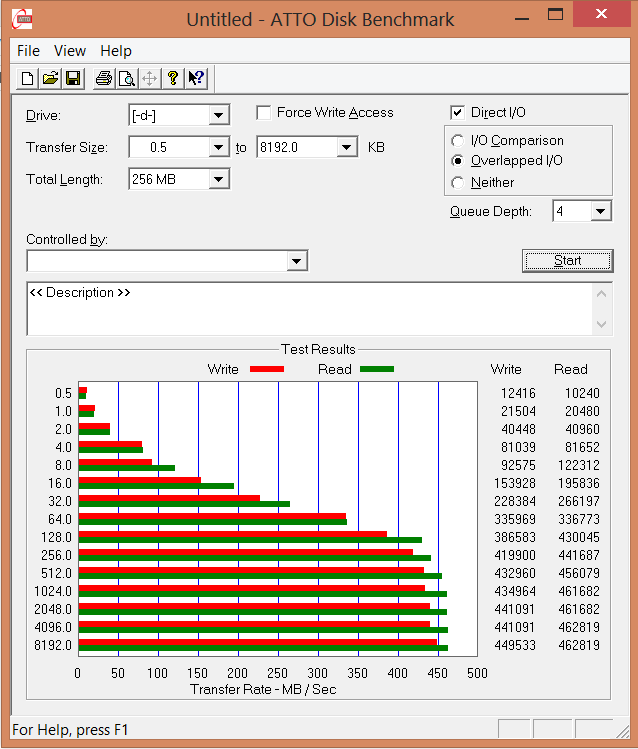PC PERFORMANCE BENCHMARKS
As the Angelbird SSD2Go External SSD is fully compatible with both PC and Mac systems, we are going to benchmark in both environments. In Windows 8, our benchmark programs will consist of ATTO Disk Benchmark Crystal DiskMark, AS SSD, Anvil Storage Utilities as well as PCMark Vantage. Most of these benchmarks are free for download and appropriate links can be found by clicking on the name of each:
ATTO Disk Benchmark is perhaps one of the oldest benchmarks going and is definitely the main staple for manufacturer performance specifications. ATTO uses RAW or compressible data and, for our benchmarks, we use a set length of 256mb and test both the read and write performance of various transfer sizes ranging from 0.5 to 8192kb. Manufacturers prefer this method of testing as it deals with raw (compressible) data rather than random (includes incompressible data) which, although more realistic, results in lower performance results.
Specifications for the SSD2Go are listed at 460MB/s read and write and initial ATTO testing confirms that this device is capable of these blazing USB 3.0 speeds.
CRYSTAL DISK BENCHMARK VER. 3.0 X64
Crystal Disk Benchmark is used to measure read and write performance through sampling of raw (0/1 Fill/compressible) or random data which is, for the most part, incompressible. In the AngelBird SSD2Go External SSD, a deviation is seen when testing with compressible data (left) and incompressible data (right):

 Compressible data speaks to your OS and software while incompressible data speaks to music, video and photographs. In the case of incompressible data, the transfer speed ONLY relates to the time it might take to transfer your media and not the play of it in any way.
Compressible data speaks to your OS and software while incompressible data speaks to music, video and photographs. In the case of incompressible data, the transfer speed ONLY relates to the time it might take to transfer your media and not the play of it in any way.
Up until recently, AS SSD was the only benchmark created specifically for SSD testing and it uses incompressible data. AS SSD, for the most part, gives us the ‘worst case scenario’ in SSD transfer speeds because of its use of incompressible data and many enthusiasts like to AS SSD for their needs. Transfer speeds are displayed on the left with IOPS results on the right.

 With AS SSD, we get our first look at IOPS performance and can see that they are significantly below the listed 85,000. Having tested the SSD alone, we can confirm that this is not the result of the SSD itself, but rather the USB 3.0 connection creating a small bottleneck with IOPS throughput.
With AS SSD, we get our first look at IOPS performance and can see that they are significantly below the listed 85,000. Having tested the SSD alone, we can confirm that this is not the result of the SSD itself, but rather the USB 3.0 connection creating a small bottleneck with IOPS throughput.
 The SSD Review The Worlds Dedicated SSD Education and Review Resource |
The SSD Review The Worlds Dedicated SSD Education and Review Resource | 

This is way cool! Nice find!
The circuit board build quality looks excellent!
I think I saw this review on TweakTown a couple days ago.
Absolutely impressive product. The addition of the supercap makes perfect sense with a removable media product. The odds of someone inadvertantly pulling this out of a USB port are rather high and the supercap just gives them a nice safety margin. My only question on these external SSD units is whether their firmware be updated over a USB link.
Yes, the firmware can be updated via USB.
Are these for girls, the SSDs can match their shoes LOL
They come in guy colors too. eheheh